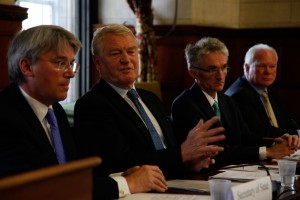March 24, 2011
Launch of the United Kingdom’s independent Humanitarian Emergency Response Review (HERR).
By Ross Mountain
Nearly a year ago the then new British government asked Lord Paddy Ashdown to lead an independent review of the United Kingdom’s humanitarian emergency response capacity (HERR).
The role of the UK in international humanitarian assistance is quite unique. While overall DFID is the third largest humanitarian donor, it exercises disproportionate influence within the humanitarian sector as it seeks to improve the system as a whole, largely employing its resources and humanitarian capacities through partners- the UN and its agencies, the Red Cross/Red Crescent Movement and NGOs.

Andrew Mitchell, UK Secretary of State, Mark Lowcock, Acting Permanent Secretary of DFID, Lord Paddy Ashdown, and Ross Mountain, DARA's Director General, during the presentation of the Humanitarian Emergency Response Review (HERR), London, March 28th, 2011.
The record of the UK in promoting humanitarian reform and other innovations is well respected. In the wake of the mega disasters in Haiti and Pakistan, it was decided that the Review should focus on how DFID might most effectively contribute to meeting the major humanitarian challenges-including those arising from climate change, urbanization and political instability- that increasingly threaten the future of vulnerable countries and populations. How it might promote changes necessary for partners to be better prepared to meet such challenges was also an essential part of the Review.
The Review was issued on March 28th in London by Paddy Ashdown in the presence of the UK Secretary of State, Andrew Mitchell. In the face of criticism of increasing instrumentalisation and politicisation of humanitarian aid, the HERR clearly reaffirms the importance of humanitarian assistance being determined by needs alone and full respect for humanitarian principles.
As last year, future demands are expected to outstrip the ability of the international system to respond. The report thus emphasises the importance of preparation, anticipation and mapping of potential disasters and conflicts, as well as building resilience in at risk countries to strengthen their institutions and the capacity of local populations to react. Building resilience will in particular require development actors, including DFID, to focus on building such local response capacity as a vital part of their development programmes.
The report further highlights:
- The need to improve the strategic and operational leadership of the international humanitarian system, especially the UN system both at the HQ and country level.
- Innovation and science must be better employed to improve anticipation and response.
- As has been emphasised so often, more accountability is needed especially to those to whom assistance is provided as well as to publics providing resources.
- Beyond strengthening partnerships with existing key players- other Good Humanitarian Donorship countries, the Red Cross/Red Crescent Movement and NGOs- new partnerships with non-DAC donors (the Gulf states, China, India and Brazil amongst others) need to be developed and links made with the capacities available in the private sector.
- Humanitarian space and civilian security needs to be protected so that safe access to humanitarian assistance is available to all populations wherever they may be in conflicted areas.
Detailed recommendations are included for each of these dimensions with the aim of improving the support that DFID and the international community will be able to extend to victims of disasters, conflicts and other hazards in the uncertain future.
These recommendations, if followed, offer a coherent approach to ensuring that appropriate, urgent and effective relief can be made available to victims of rapid onset crises.
Ross Mountain is Director General of DARA. He was Director of the United Kingdom’s independent Humanitarian Emergency Response Review (HERR).
Share this